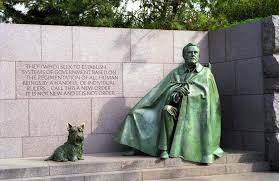By Catherine Brack, Washington D.C. | As a resident of our nation’s capitol for more than 18 years, I have been to the Clinton, Bush and Obama White Houses, experienced 9/11 in a way that was far too close for comfort, cheered a visit by the pope, and witnessed an earthquake, hurricanes and tornadoes. I also have shoveled more snow than I ever thought possible.
One of the true joys of living in the nation’s capital is witnessing through the eyes of others the daily sights that I often take for granted. GwinnettForum readers will know that my parents often visit, and we’ve had great adventures, not the least of which was a recent inside-the-park home run at the Nats game earlier this month. A recent visit of a decades-long friend from California reacquainted me with the brilliance and utter elegance of one of Washington’s key attractions, the Franklin Delano Roosevelt Memorial.
 In a time when our current political discourse is reaching new lows, it is refreshing to revisit a past when this country wasn’t about “hope” or “making America great again,” but was about being bold, making tough calls and striving to treat everyone — regardless of place of origin or economic status — with dignity. Can you imagine our current political “leaders” ever uttering these statements:
In a time when our current political discourse is reaching new lows, it is refreshing to revisit a past when this country wasn’t about “hope” or “making America great again,” but was about being bold, making tough calls and striving to treat everyone — regardless of place of origin or economic status — with dignity. Can you imagine our current political “leaders” ever uttering these statements:
“No country, however rich, can afford the waste of its human resources. Demoralization caused by vast unemployment is our greatest extravagance. Morally, it is the greatest menace to our social order.” (Sept. 30, 1934).
“We must scrupulously guard the civil rights and civil liberties of all our citizens, whatever their background. We must remember that any oppression, any injustice, any hatred, is a wedge designed to attack our civilization.” (Jan. 9, 1940).
“They [who] seek to establish systems of government based on the regimentation of all human beings by a handful of individual rulers…call this a new order. It is not new and it is not order.” (March 15, 1941).
These are samples of the simple, elegant language that address the heart of three challenges, each of which then was followed by policies that backed up the rhetoric. And while there will always be 20/20 fault to find with anyone who is in a position of leadership — the continued racism experienced by African-Americans among them — the legacy of this great and, as we all know, longest-serving president has stood the test of time.
FDR’s New Deal, like it or hate it, was a big vision with long-term benefit. The Tennessee Valley Authority provided the rural South with electricity. In the heart of the Great Depression, Roosevelt and his aides designed the Social Security Act to combat poverty among senior citizens. The Works Progress Administration was designed to give out-of-work citizens what they really needed — jobs.
Policy matters. For this country to address the inevitable big problems of the future, we need courageous leaders to debate policy on core principles and beliefs, not simplistic sound bites driven by personality or gotcha-tweets.
- Immigration.
- Guns.
- Infrastructure
- Economic opportunity.
- Civil rights.
What our current political discourse is missing is bold vision coupled with action steps.
You cannot run a business on dreams, nor can you govern without compromise. As FDR said, “The only thing we have to fear is fear itself.” If we don’t start again doing the hard work of governing, we only have ourselves to blame for not living up to this vision for America:
“Freedom of speech…Freedom of worship…Freedom from want…Freedom from fear.” (Jan. 6, 1941).










Follow Us